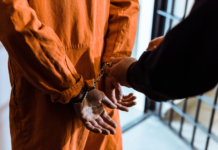A German court sentenced neo-Nazi Beate Zschaepe to life in prison on Wednesday for murders and bomb attacks targeting Turkish immigrants committed by terrorist group the National Socialist Underground (NSU).
At Munich’s Higher Regional Court, Presiding Judge Manfred Goetzl said Zschaepe was guilty of membership in a terrorist group and complicity in 10 murders and two bomb attacks committed by the neo-Nazi group, according to a report by Turkey’s state-run Anadolu news agency.
The NSU killed eight Turkish immigrants, a Greek citizen, and a German policewoman between 2000 and 2007, but the murders long remained unsolved. The group also carried out bomb attacks targeting shops owned by immigrants in Cologne.
During the five-year trial, Zschaepe denied any role in the killings and bomb attacks and tried to lay the blame on her two late colleagues in the far-right terror cell. But her defense team failed to present strong evidence to dispute the accusations.
The NSU was only revealed in 2011, when two members, Uwe Mundlos and Uwe Bohnhardt, died after an unsuccessful bank robbery and police found guns and extreme-right literature in their apartment.
According to the report, Zschaepe, the group’s last surviving member, has provided no new information about the NSU, and major questions over the murders remain unanswered.
The NSU attacks were the most violent of their kind in Germany since the end of the far-left Red Army Faction’s two-decade killing spree in 1991, which left at least 34 dead. Last week, Zschaepe told the court she did not know how the victims were chosen. She said she only realized the full extent of the crimes after she turned herself in, according to a report by Reuters.
Zschaepe’s lawyers had urged the court to convict her of the lesser charges of arson and robbery. But the court convicted her of 10 counts of murder and handed down its toughest sentence. Zschaepe, wearing a purple and white scarf and black outfit that matched her black hair, chatted calmly with her lawyer in the courtroom before the verdict was read out.
Turkish Foreign Minister Mevlüt Çavuşoğlu on Wednesday spoke out on the verdict, calling on Berlin to reveal the role of officials from the intelligence service and other state institutions in the murder of the 10 people, TRT Haber reported.
Zschäpe’s accomplice Ralf Wohlleben, who was found to have supplied the gun with which all the murders were carried out, was sentenced to 10 years in prison.
“Punishment of the top suspect and other suspects is not enough. Who was behind these murders in the intelligence service, in the deep state? Which state institutions? They must be exposed and punished, too,” said Çavuşoğlu.
According to a Deutsche Welle report, Zschäpe was also found guilty of membership in and foundation of a terrorist organization. Judge Manfred Götzl also attributed Zschäpe with serious culpability, which means the 43-year-old is likely to serve more than the minimum of 15 years.
The Munich state court ruling marks the end of one of the most important trials in Germany’s post-war history. It was also one of the most complex, covering five years, more than 430 trial days and the testimonies of several hundred witnesses. Nine of the NSU’s victims were of an immigrant background, while the tenth was a police officer.
A number of community organizations, opposition political parties and lawyers released statements saying the verdict should not be seen as the conclusion of the NSU case and calling for more investigations into Germany’s neo-Nazi terrorist network.
“Angela Merkel and many others promised the victims a complete investigation. That promise was broken,” said Gökay Sofuoglu, chairman of the Turkish community organization TGD, in a statement, DW reported.
In Germany, the scandal surrounding the NSU has led to widespread criticism of police and security agencies, who stand accused by opposition parties of tolerating right-wing extremists, stereotyping and discrimination against immigrants.
Until 2011, Germany’s police and intelligence services ruled out any racial motive for the murders and instead treated immigrant families as suspects, questioning them over alleged connections with mafia groups and drug traffickers.
While recent revelations have shown that Germany’s domestic intelligence agency had dozens of informants who had contacts with the NSU suspects, officials insisted that they had no prior information about the NSU terror cell and its suspected role in the killings.
















